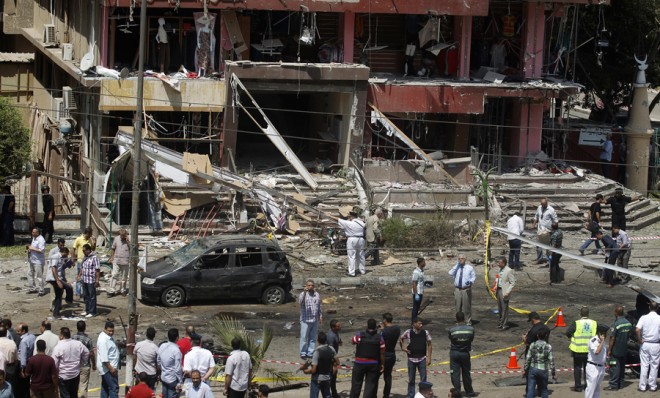How a terrorist attack hurts the cause of Egypt's Islamists
An assassination attempt on the interior minister plays straight into the military regime's hands

A free daily email with the biggest news stories of the day – and the best features from TheWeek.com
You are now subscribed
Your newsletter sign-up was successful
This week saw the return of terrorist tactics in Egypt, which has been largely free of such attacks since the 1990s. But the military regime is hardly shaking in its boots.
On Thursday, a powerful bomb blasted through the convoy of Interior Minister Mohamed Ibrahim in Cairo's Nasr City, killing one police officer and maiming at least 21 people, including a child who lost a leg. But Ibrahim, the official responsible for security and policing, emerged from his damaged, heavily armed car unharmed. In fact, he sounded a virtually triumphant note.
He called the attack the start of "a new wave of terrorism," adding, "What happened today is not the end, but the beginning." Appearing on state TV just hours after the attack, Ibrahim said the government would do all it could to destroy the militants. "Even if I am martyred, another interior minister will come and continue the war on this evil terrorism until we secure the country," he said.
The Week
Escape your echo chamber. Get the facts behind the news, plus analysis from multiple perspectives.

Sign up for The Week's Free Newsletters
From our morning news briefing to a weekly Good News Newsletter, get the best of The Week delivered directly to your inbox.
From our morning news briefing to a weekly Good News Newsletter, get the best of The Week delivered directly to your inbox.
The Muslim Brotherhood denounced the attack and denied responsibility. A group affiliated with it, the Anti-Coup Alliance — which wants the reinstatement of Egypt's former Islamist president, Mohammed Morsi, who was ousted by the military in July — said terrorism was not even in the group's interests. "We expect that such incidents will be used to extend the state of emergency and to increase the use of oppression, repression, and detention which have been used by the coup authority."
And that's probably true. So why would Islamists turn to terrorism? One answer is that they're not a monolithic entity. The Muslim Brotherhood can't control every member or sympathizer, and as David D. Kirkpatrick and Mayy El Sheikh point out in The New York Times, the group has been warning that "some in their ranks would give up on the democratic process and resort to violence, just as some did in the 1990s."
For those ready to take up arms, the interior minister was an obvious target, "singularly reviled by Mr. Morsi's Islamist supporters as a kind of triple traitor," say Kirpatrick and El Sheikh:
He was a senior ministry official under former President Hosni Mubarak, and then accepted a promotion to interior minister under Mr. Morsi, pledging loyalty to Egypt's first elected government. But during the wave of anti-Brotherhood violence that preceded the military takeover, Mr. Ibrahim refused to protect the group or Mr. Morsi. And now Mr. Ibrahim has held on to his post as minister under the government that ousted Mr. Morsi. In fact, Mr. Ibrahim has overseen the killing of hundreds of Morsi supporters. [The New York Times]
Ask Egyptians, though, and you'll get another answer: Many say the Islamists are simply violent jihadists who no longer feel they have anything to lose. Hassan Abou Taleb in Egypt's Ahram Online says that even though millions of Egyptians rose up this summer in an unprecedented display of unity to oust the Islamists, "the Brotherhood is still living in the past and has delusions of conquering Egypt once again with NATO-backed Turkish spears."
A free daily email with the biggest news stories of the day – and the best features from TheWeek.com
Like many Egyptians, Taleb blames the Brotherhood, not the military, for the bloodshed last month during the clearing of pro-Morsi sit-ins. He says that the protesters were armed, and that they targeted Coptic Christians and others in an act of "flagrant terrorism that Egyptians will never forget and history will never forgive, despite efforts by frauds, hired hands, liars and hypocrites to alter or blur the facts."
The result: A bomb blast makes Egyptians more likely to rally around their current, unelected government.
Cambridge University sociologist Hazem Kandil, an expert on Egypt's security apparatus, told TIME that Egypt under Morsi had squandered its chance to reinvent itself as something other than a police state. Morsi, whether by design or impotence, never reformed the hated security apparatus inherited from the Mubarak era. Kandil: "Many Egyptians said, 'Well since we're going to be living under a police state anyway, then we better be living under a police state that we are used to, a kind of a secular police state rather than a police state that supports religious fascism.'"
Susan Caskie is The Week's international editor and was a member of the team that launched The Week's U.S. print edition. She has worked for Radio Free Europe/Radio Liberty, Transitions magazine, and UN Wire, and reads a bunch of languages.
-
 Buddhist monks’ US walk for peace
Buddhist monks’ US walk for peaceUnder the Radar Crowds have turned out on the roads from California to Washington and ‘millions are finding hope in their journey’
-
 American universities are losing ground to their foreign counterparts
American universities are losing ground to their foreign counterpartsThe Explainer While Harvard is still near the top, other colleges have slipped
-
 How to navigate dating apps to find ‘the one’
How to navigate dating apps to find ‘the one’The Week Recommends Put an end to endless swiping and make real romantic connections